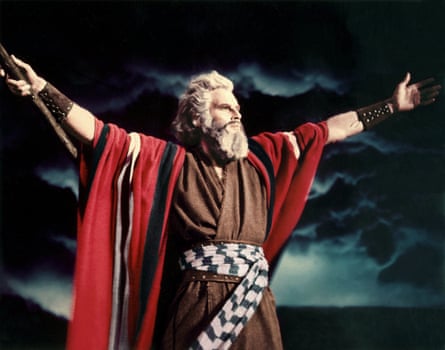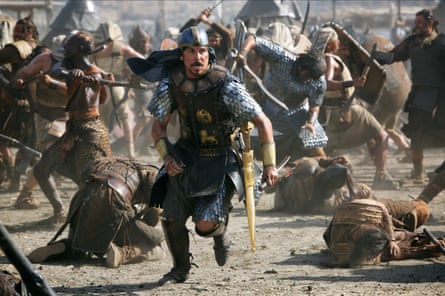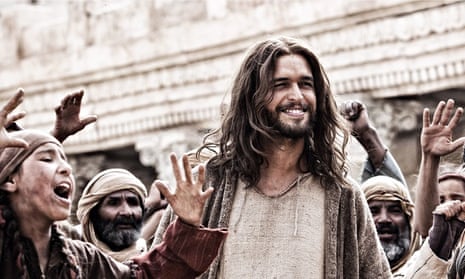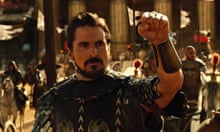Big news from the box office: some people released some Christian-themed movies that weren’t completely terrible. The terribleness of Christian movies is, of course, an article of faith among film critics, who reserve for them their most damning barbs (“doesn’t even meet the standards of decent propaganda”; “doesn’t belong in a theatre”). On Metacritic and Rotten Tomatoes, they garner basement-level scores rivalled only by torture porn and holocaust-exploitation flicks. But not this year, which has seen box-office success for studio-backed movies such as Son of God ($67m since its debut in late February), Darren Aronofsky’s Noah ($359m), God’s Not Dead ($60m), Heaven is for Real ($91m), and, soon Ridley Scott’s retelling of the story of Moses, Exodus. In October, we can look forward to Left Behind, a remake of a 2002 end-of-days conspiracy thriller starring Nicolas Cage. Also in the offing: a star-studded cast in the long-awaited prequel to The Passion of the Christ (Mary, Mother of Christ) and a Cain and Abel film set to star Will Smith. Some have christened this “year of the Bible movie”.
“Having not just one do so well is a big deal, but having so many – Heaven is for Real, God’s Not Dead and Son of God – all come along and do well in the space of this year is unprecedented,” says Shawn Robbins, an analyst at boxoffice.com. “No doubt about it, Hollywood has been caught napping.” He attributes a big part of this to social media. “Thirty years ago you had network television, trying to appeal to everyone. Now you can reach a niche audience with much greater ease. They have these grassroots marketing campaigns for faith-based movies that start with churchgoers who are looking for something they’re not getting from the movie theatre. And the better they do, the more attention they’re getting from the studios.”
To anyone familiar with William Goldman’s dictum that “nobody knows anything” the term “faith-based movie” will make zero sense: 99% of the time Hollywood works on nothing but faith. But the term is used more specifically to refer to the mushroom patch of independently produced, Christian-themed movies that sprang up in the shadow of Mel Gibson’s The Passion of the Christ 10 years ago. Often released straight to video, and promoted via viral campaigns by groups such as the American Family Association and the Concerned Women of America, they induce a spooky sensation in the secular viewer. It’s as if one has left one’s body and touched down in another, alternative universe, full of actors you’ve never heard of playing characters with porn movie names – Raymie Steele, Shasta Carvell, Buck Williams – who emote, soapily, to the kind of music that you hear while on hold to speak to someone about life insurance. No one smokes or curses. The men are usually cops, or firefighters, and often have a black best friend, dispensing gold-plated advice. There is a higher-than-average chance of encountering a mullet, or a cameo by a cast member from Duck Dynasty, or a product placement for Chick-fil-A.

By contrast, Heaven Is for Real, released earlier this year, came from a real studio, Sony, and featured a real actor, Greg Kinnear, playing a pastor whose son claims to have visited heaven while undergoing an appendectomy. To be accurate, Kinnear suffers a fractured leg and passes a round of kidney stones before his son suffers a burst appendix – faith-based movies are big on hospital visits – but the dilemma that follows is the main event, as Kinnear grapples with the question of whether he believes his son or not. The film backs the son all the way: heaven turns out to resemble a toilet-roll commercial and Jesus looks like Rod Stewart in a bathrobe, with music that sounds like the music you hear while on hold to check on your pension. Still, the film has irony, doubt, humour and a moderately gripping drama of tested faith. “Not stupid in the way you’re thinking,” concluded Salon’s Andrew O’Hehir. A backhanded compliment, but still: a backhanded compliment! From a real critic! That’s an important milestone for a genre seeking Hollywood gentrification.
In some ways these films are a straightforward response to box-office disenfranchisement: a burp from the bible belt, ignored by an industry set on manufacturing global blockbusters. On the east and west coasts of America, the response has been to stay home and watch HBO, while the heartland turns out for The Blind Side, in numbers that have necessitated a shift in the battle lines between Christianity and Hollywood. As recently as 10 years ago, the news that a movie adaptation of a story from Genesis, by atheist Darren Aronofsky, featuring CGI rock monsters and a homicidal Noah, would have prompted outrage from the evangelical right, maybe even a boycott, certainly a placard or two. But despite efforts from the likes of Glenn Beck to drum up controversy, the film’s release, via an internet-savvy promotional campaign from Paramount, was met with a noticeably nuanced response from Christian groups – mixed to be sure, but not giving off the night sweats of a belief-system under seige.
“Noah is not poorly made or shoddy,” ran a seven-page review in Christianity Today. “It is not political. It is not evangelistic. It is not a theological treatise.” Furthermore, the writer meant that as praise. For its qualities as a movie.
“As a Christian I worship the creator of creativity,” says Marcus Pittman, a Christian documentary film-maker working in Virginia, who released his guide to dealing with atheists, How to Answer the Fool, on the internet. “There used to be this attitude of well, they’ve made this terrible movie, but it’s all in the name of Jesus so we should go. People were happy to have at least something. But this idea that Christian movies as a genre – this kind of Joel Olsteen, chicken-soup-for-the-soul version of Christianity, ‘the number one inspirational movie in America’ where everything has a happy ending – it’s kind of insulting. Bad movies are kind of blasphemy to the image of God. A lot of Christians I know watch Marvel movies. There’s good versus evil, there’s a hero, they’re clean. They’re very Biblical. Superhero movies have a massive Christian fanbase. I see kids coming to church dressed as Superman all the time.”
This is a far cry from the paranoia that has characterised the relationship between Christianity and Hollywood in the past. In 1913, there was a ban on building cinemas within 200ft of a church in some American states. “To make money by lying to people when one is in the consciousness business is a particularly serious perversion,” wrote American theologian Harvey Cox in 1962, whose objections to Hollywood went far beyond the normal objections to its lifestyle and morality – although he did, like most, view it as the second coming of Sodom and Gomorrah – but cut to the very issue of cinematic representation itself. “To lie with an artform is all at once to have another god, to make graven images, to steal, and to bear false witness. The theological judgment on such efforts as Ben-Hur and The Ten Commandments should find its inspiration in the reaction of Moses to the Golden Calf.” That is: condemnation, death and destruction.

As shrill as some of this sounds today, Christian fears that the movies would usurp the church’s role as a place of worship have been largely proven correct. No other medium is as well placed to offer transcendence. “The cinema has done more for my spiritual life than the church,” wrote John Updike. “My ideas of fame, success and beauty all originate from the big screen. Whereas Christian religion is retreating everywhere and losing more and more influence; film has filled the vacuum and supports us with myths and action-controlling images. During a certain phase in my life film was a substitute for religion.”
The rivalry between the two masks a lurking kinship, though. “Motion pictures were not born in religious practice, but instead are a totally profane offspring of capitalism and technology,” writes Paul Schrader in his landmark book, Transcendental Style in Film, in which he isolates two strains of religious film-making: the epics of Cecil B DeMille, presenting religion as spectacle, with teeming hordes, VistaVision, shafts of light, and strangely subdued orgies. “Give me any couple of pages of the Bible and I’ll give you a picture,” boasted DeMille. The second stream is that of the austere transcendentalists of the arthouse – Yasujiro Ozu, Robert Bresson, Carl Dreyer – who, recognising the over-abundant, material “fallen” nature of the medium, pursue an aesthetic of scarcity, sparseness, abnegation. “The sparse means,” said Jacques Maritain in Religion and Culture (1932) are the “proper means of the spirit”.

The austerity of Bresson and Dreyer is hardly the model many contemporary Christian film-makers have in mind – Terrence Malick’s The Tree of Life bypassed evangelicals almost completely – but to bemoan the terribleness of Christian movies is, in some ways, to miss the point. Their terribleness is the point – a badge of independence from Hollywood’s corrupting glamour, the very paltriness of their artistic ambitions a reassuring sign of the sincerity of their belief. There is a kind of bonkers integrity to a film like Left Behind, Kirk Cameron’s end-of times conspiracy thriller, which sold 2.8m video copies in 2002. Who even knew there were 2.8m VCRs left in America? In its valiant attempt to link the Biblical rapture, a global currency meltdown, the rise of the Antichrist (through the UN, naturally) and war in the Middle East, using an abandoned quarry in Ontario (“whoever this Antichrist guy is, he’s going to have a huge war on his hands”), the film is propelled by the same mad belief as Ed Wood’s doomsdays-on-the-cheap. It’s so artistically bereft that only a belief in a higher power could explain its existence.
Hence the suspicion on Christian social networks that has greeted the news that Nicolas Cage was to star in the remake: is Cage even a Christian? Some claimed he was “not a believer”, others that he was a Scientologist and that the film would be “a big deception”. Others pushed back: “He’s not making this movie, he’s acting in it. Please do a little more fact-checking.”
There is a distinct danger, some say, of Hollywood moving into the market too fast, with too little understanding of the dog-whistle finesse with which Christian groups communicate with one another. “Like any good trend, there’s a danger of moving too fast,” says Robbins. “If they do move too fast they’re going to destroy whatever goodwill they’ve built up so far. It’s just like anything else, there’s a sweet spot to it. Mel Gibson made The Passion of The Christ independently but pulled off the perfect marriage of a film that looked and felt like a Hollywood movie but wasn’t. If Hollywood gets too involved the target audience will disperse pretty quick.”
Or as Luke (16:13) puts it: “No one can serve two masters. For you will hate one and love the other, or be devoted to one and despise the other. You cannot serve both God and money.”











Comments (…)
Sign in or create your Guardian account to join the discussion